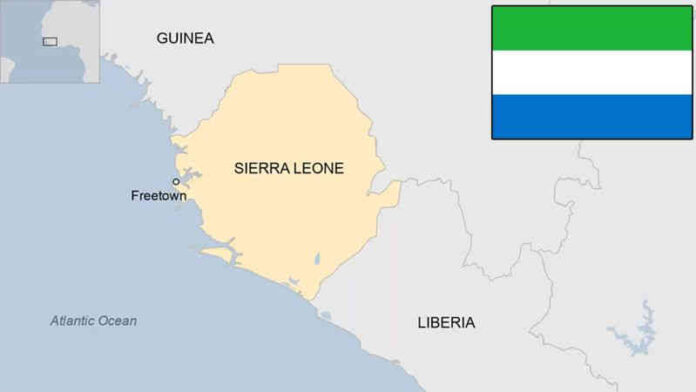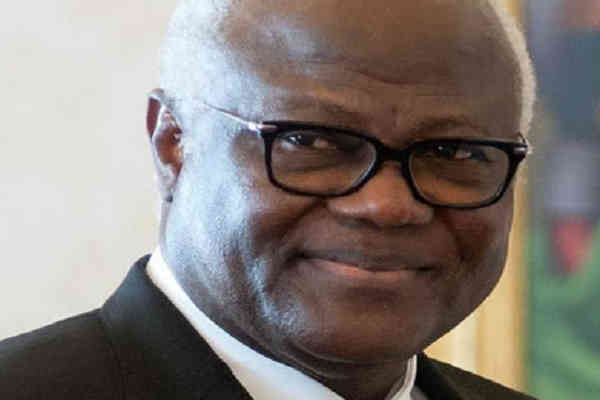Coup Attempt in Sierra Leone: Government Enforces Nationwide Curfew
In response to an attempted breach of the armoury at a military barracks in the capital, Freetown, the government has imposed a nationwide curfew in Sierra Leone.
The President issued a statement from his residence, asserting that the situation is under control. However, eyewitnesses on the ground report ongoing disturbances.
Residents of Freetown heard intense gunfire from the Wilberforce military barracks, located near the presidential lodge, early on Sunday morning.
A statement from the Ministry of Information announced an immediate curfew, urging citizens to stay indoors.
President Julius Maada Bio stated that calm has been restored, and a manhunt is underway to apprehend the remaining perpetrators.
While crowds cheered the display of soldiers in vehicles in Mali, a BBC reporter in Freetown highlighted the unclear situation. The reporter observed soldiers armed with heavy weapons, with some chanting about their intentions to “clean Sierra Leone.
In June, President Julius Maada Bio secured re-election after narrowly avoiding a run-off. In August, several individuals, including high-ranking military personnel, were arrested and accused of plotting a coup against the president.
Over the past three years, several West and Central African countries, including neighbouring Guinea, have experienced coups, leading to military rule.
We will continue to provide updates attempted Coup in Sierra Leone.
Sierra Leone Profile:
Sierra Leone, a West African country, holds special significance in the history of the transatlantic slave trade, serving as a departure point for thousands of West African captives.
The capital, Freetown, was established in 1787 as a home for repatriated former slaves.
The modern history of the country is overshadowed by a brutal civil war that concluded in 2002 with the assistance of Britain, the former colonial power, and a substantial United Nations peacekeeping mission.
Despite experiencing significant economic growth in recent years, Sierra Leone still grapples with the lingering effects of the civil war.
Rich in diamonds and other minerals, the country has sought to combat the illicit trade of gems, known as “blood diamonds,” which played a role in funding conflicts during the civil war. The government is actively working to curb this illegal business.
Sierra Leone’s Turbulent History: From Civil War to Independence
Sierra Leone has endured a tumultuous history marked by a prolonged civil war, during which even child soldiers were drawn into the conflict. Let’s delve into key historical milestones:
500BC Onwards: Successive groups of people settle in Sierra Leone, facing the challenges posed by dense tropical rainforests that partially separate the region from other West African cultures.
1462: Portuguese explorer Pedro de Sintra maps the hills around what is now known as Freetown, naming them “Serra da Leoa” or “Serra Leoa” – Lioness Mountains.
1495: Portuguese traders establish a fortified trading post on the coast. Other nations, including the Dutch, English, and French, follow suit, establishing trading stations primarily focused on the slave trade.
1787: In the aftermath of the British defeat in the American Revolutionary War, thousands of Black Loyalists seek refuge in Sierra Leone, Canada, the West Indies, or London. British philanthropists establish a settlement in Sierra Leone to alleviate poverty, facing resistance from locals.
1792: Black Loyalists who initially settled in Nova Scotia, Canada, faced challenges and discrimination. Philanthropists assisted nearly 1,200 individuals who chose to relocate to Sierra Leone and establish the settlement of Freetown.
1808: Freetown settlement becomes a crown colony. With the abolition of slavery, the Royal Navy repatriates thousands of former African slaves to Freetown after freeing them from illegal slave ships.
1896: Britain establishes a protectorate over the Freetown hinterland.
1961: Sierra Leone gains independence.
1967: A military coup removes Premier Siaka Stevens’ government, but he returns to power the following year, becoming president in 1971 after Sierra Leone becomes a republic.
1991: The civil war begins, led by former army corporal Foday Sankoh and his Revolutionary United Front (RUF) against President Joseph Saidu Momoh. They capture towns bordering Liberia.
1992: President Joseph Momoh is ousted in a military coup led by Captain Valentine Strasser. Under international pressure, Strasser announces plans for the first multi-party elections since 1967. The country witnesses a series of coups, leading to frequent changes in leadership.
2000: UN forces intervene in the east of the country, facing attacks and the kidnapping of hundreds of UN troops. Rebels attempt to seize Freetown, prompting the deployment of British paratroopers to evacuate citizens and secure the airport for UN peacekeepers. Rebel leader Foday Sankoh is captured.
2002: The civil war concludes, with the disarmament of 45,000 fighters. The government and the UN agree to establish a war crimes court. British troops conclude their two-year mission to help end the conflict.
2003: Rebel leader Foday Sankoh dies of natural causes while awaiting trial for war crimes.
2004: Sierra Leone holds its first local elections in more than three decades, and war crimes trials begin to investigate atrocities committed by both sides during the conflict.
2014-2016: Sierra Leone declares a state of emergency to combat the deadly Ebola outbreak in West Africa, resulting in the deaths of over 11,000 people in the region.
Stay informed with historical insights on attempted Coup in Sierra Leone. Thank you for using this Newsonline Nigeria platform to stay informed about the latest news in Nigeria now; always visit Ejesgist.ng for more Naija News








